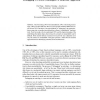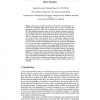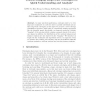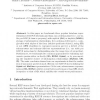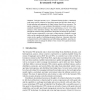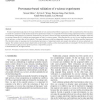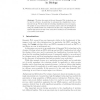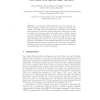SEMWEB
2005
Springer
15 years 7 months ago
2005
Springer
Abstract. After becoming a W3C Recommendation, OWL is becoming increasingly widely accepted and used. However most people still find it difficult to create and use OWL ontologies...
128
click to vote
SEMWEB
2005
Springer
15 years 7 months ago
2005
Springer
Abstract. We present a method for rapid development of benchmarks for Semantic Web knowledge base systems. At the core, we have a synthetic data generation approach for OWL that is...
125
click to vote
SEMWEB
2005
Springer
15 years 7 months ago
2005
Springer
In many practical applications, ontologies tend to be very large and complicated. In order for users to quickly understand and analyze large-scale ontologies, in this paper we prop...
113
click to vote
SEMWEB
2005
Springer
15 years 7 months ago
2005
Springer
Abstract. In this paper we benchmark three popular database representations of RDF/S schemata and data: (a) a schema-aware (i.e., one table per RDF/S class or property) with explic...
131
click to vote
SEMWEB
2005
Springer
15 years 7 months ago
2005
Springer
This paper presents SERSE – SEmantic Routing SystEm– a distributed multi-agent system composed of specialised agents that provides robust and efficient gathering and aggregati...
108
click to vote
SEMWEB
2005
Springer
15 years 7 months ago
2005
Springer
Abstract. Coordination is the process of managing the possible interactions between activities and processes; a mechanism to handle such interactions is known as a coordination reg...
104
click to vote
SEMWEB
2005
Springer
15 years 7 months ago
2005
Springer
E-science experiments typically involve many distributed services maintained by different organisations. After an experiment has been executed, it is useful for a scientist to ver...
111
click to vote
SEMWEB
2005
Springer
15 years 7 months ago
2005
Springer
We show how state-of-the-art Semantic Web technology can be used in e-Science, in particular to automate the classification of proteins in biology. We show that the resulting clas...
133
click to vote
SEMWEB
2005
Springer
15 years 7 months ago
2005
Springer
Abstract. In the Semantic Web information would be retrieved, processed, combined, shared and reused in the maximum automatic way possible. Obviously, such procedures involve a hig...
101
click to vote
SEMWEB
2005
Springer
15 years 7 months ago
2005
Springer
Ontologies are today a key part of every knowledge based system. They provide a source of shared and precisely defined terms, resulting in system interoperability by knowledge sha...
